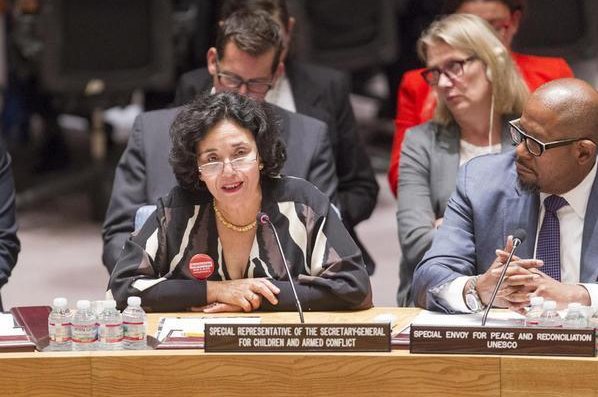United Nations Special Representative for Children and Armed Conflict Leila Zerrougui (l) addressed the U.N. Security Council on September 9, 2014 about the effect of today's armed conflicts on children, and was joined by Forest Whitaker, UNESCO’s Special Envoy for Peace and Reconciliation. (Twitter/U.N.)
NEW YORK, Sept. 9 (UPI) -- The Islamic State -- also known as ISIL -- is utilizing children as soldiers and suicide bombers, a senior United Nations official said Monday.
Testifying before the U.N. Security Council, the Secretary-General's Special Representative for Children and Armed Conflict Leila Zerrougui presented her latest report on the effect of armed conflict on children, particularly with regard to exploitation by extremist groups.
"ISIL has tasked boys as young as 13 to carry weapons, guard strategic locations or arrest civilians. Other children are used as suicide bombers."
Children are similarly at risk of engaging in armed conflict in Afghanistan, Central African Republic, Libya, Mali and South Sudan, Zerrougui noted, whether as child soldiers for rebels and terrorists or for government militias.
Earlier this year, Zerrougui partnered with the U.N. Children's Fund to launch the "Children, Not Soldiers" campaign with the goal of "no children in Government forces by the end of 2016."
Zerrougui was joined Monday by Academy Award-winning actor and UNESCO's Special Envoy for Peace and Reconciliation Forest Whitaker, who had recently returned from visiting embattled South Sudan.
Whitaker described what he saw during his visit. "After meeting with generals on the ground, soldiers and civilians, I fear that there is no end in sight to the violence... Perhaps worst of all, walking through the cities, I saw child soldiers wearing military uniforms and carrying guns."
"We may take a child out of an army, but unless we do more for him -- help him re-enter society, enroll him in a good school, teach him a useful trade -- we have not set him free," Whitaker remarked.''
Zerrougui echoed that sentiment, adding that "Longstanding peace will never be achieved without giving the children the means, skills, and education to re-build a society and institutions torn by armed conflict."
In Iraq, the U.N. recorded 700 children were killed, including summary executions, or maimed in 2014. In Nigeria, at least 100 students and 70 teachers were killed by Boko Haram. More than 500 children have been killed and 1,300 injured in Gaza during the recent conflict.
"We cannot afford impunity in the face of such grave violations of international law that in some cases may amount to war crimes," Zerrougui told the Council.















